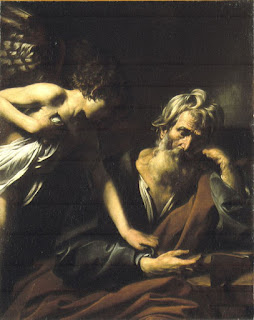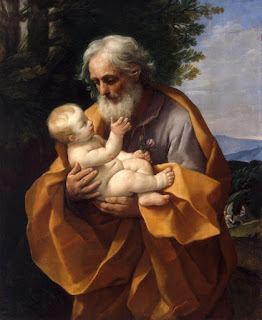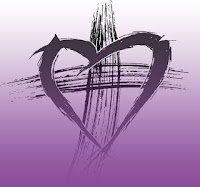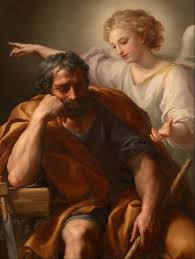As we approach Christmas during this season of Advent, it is a good time to consider the story of Joseph and his generosity with regard to Mary and Jesus.
[[. . .Especially poignant is the Matthean story of Joseph as the icon of one who struggles to allow God's own justice to be brought to birth as fully as possible. It is, in its own way, a companion story to Luke's account of Mary's annunciation and fiat. Both Mary (we are told explicitly) and Joseph (we are told implicitly) ponder things in their hearts, both are mystified and shaken by the great mystery which has taken hold of them and in which they have become pivotal characters. Both allow God's own power and presence to overshadow them so that God might do something absolutely new in their world. But it is Joseph's more extended and profound struggle to truly do justice in mercy, and to be a righteous man who reveals God's own justice in love, God's salvation, that was at the heart of yesterday's Advent story.
The Situation:
I am a little ashamed to say I have never spent much time considering Joseph's predicament or the context of that predicament until this week. Instead I have always thought of him as a good man who chose the merciful legal solution rather than opting for the stricter one. I never saw him making any other choice nor did I understand the various ways he was pushed and pulled by his own faith and love. But Joseph's situation was far more demanding and frustrating than I had ever appreciated! Consider the background which weighed heavy on Joseph's heart. First, he is identified as a just or righteous man, a man faithful to God, to the Covenant, a keeper of the Law or Torah, an observant Jew who was well aware of Jeremiah's promise and the sometimes bitter history of his own Davidic line. All of this and more is implied here by the term "righteous man". In any case, this represents his most foundational and essential identity. Secondly, he was betrothed to Mary, wed (not just engaged!) to her though he had not yet taken her to his family home and would not for about a year. That marriage was a symbol of the covenant between God and his People Israel. Together he and Mary symbolized the Covenant; to betray or dishonor this relationship was to betray and profane the Covenant itself. This too was uppermost in Joseph's mind precisely because he was a righteous man.

Thirdly, he loved Mary and was entirely mystified by her pregnancy. Nothing in his tradition prepared him for a virgin birth. Mary could only have gotten pregnant through intercourse with another man so far as Joseph could have known --- and this despite Mary's protestations of innocence. (The OT passage referring to a virgin is more originally translated as "young woman". Only later as "almah" was translated into the Greek "parthenos" and even later was seen by Christians in light of Mary and Jesus' nativity did "young woman" firmly become "a virgin".) The history of Israel was fraught with all-too-human failures which betrayed the covenant and profaned Israel's high calling. While Joseph was open to God doing something new in history it is more than a little likely that he was torn between which of these possibilities was actually occurring here, just as he was torn between believing Mary and continuing the marriage and divorcing her and casting her and the child aside.
What Were Joseph's Options?
Under the Law Joseph had two options. The first involved a very public divorce. Joseph would bring the situation to the attention of the authorities, involve witnesses, repudiate the marriage and patrimony for the child and cast Mary aside. This would establish Joseph as a wronged man and allow him to continue to be seen as righteous or just. But Mary could have been stoned and the baby would also have died as a result. The second option was more private but also meant bringing his case to the authorities. In this solution Joseph would again have repudiated the marriage and patrimony but the whole matter would not have become public and Mary's life or that of the child would not have been put in immediate jeopardy. Still, in either instance Mary's shame and apparent transgressions would have become known and in either case the result would have been ostracization and eventual death. Under the law Joseph would have been called a righteous man but how would he have felt about himself in his heart of hearts? Would he have wondered if he was just under the Law but at the same time had refused to hear the message of an angel of God, refused to allow God to do something new and even greater than the Law?
Of course, Joseph might have simply done nothing at all and continued with the plans for the marriage's future. But in such a case many problems would have arisen. According to the Law he would have been falsely claiming paternity of the child --- a transgression of the Law and thus, the covenant. Had the real father shown up in the future and claimed paternity Joseph would then have been guilty of "conniving with Mary's own sin" (as Harold Buetow describes the matter). Again Law and covenant would have been transgressed and profaned. In his heart of hearts he might have believed this was the just thing to do but in terms of his People and their Covenant and Law he would have acted unjustly and offended the all-just God. Had he brought Mary to his family home he would have rendered them and their abode unclean as well. If Mary was guilty of adultery she would have been unclean --- hence the need for ostracizing her or even killing her!
Entering the Liminal Place Where God May Speak to Us:

All of this and so much more was roiling around in Joseph's heart and mind! In one of the most difficult situations we might imagine, Joseph struggled to discern what was just and what it would mean for him to do justice in our world! Every option was torturous; each was inadequate for a genuinely righteous man. Eventually he came to a conclusion which may have seemed the least problematical even if it was not wholly satisfactory, namely to put Mary away "quietly", to divorce her in a more private way and walk away from her. And at this moment, when Joseph's struggle to discern and do justice has reached it's most neuralgic point, at a place of terrible liminality symbolized in so much Scriptural literature by dreaming, God reveals to Joseph the same truth Mary has herself accepted: God is doing something unimaginably new here. He is giving the greatest gift yet. The Holy Spirit has overshadowed Mary and resulted in the conception of One who will be the very embodiment of God's justice in our world. Not only has a young woman come to be pregnant but a virgin will bear a child! The Law will be fulfilled in Him and true justice will have a human face as God comes to be Emmanuel in this new and definitive way.
Joseph's faith response to God's revelation has several parts or dimensions. He decides to consummate the marriage with Mary by bringing her to his family home but not as an act of doing nothing at all and certainly not as some kind of sentimental or cowardly evasion of real justice. Instead it is a way of embracing the whole truth and truly doing justice. He affirms the marriage and adopts the child as his own. He establishes him in the line of David even as he proclaims the child's true paternity. He does this by announcing this new Son's name to be Jesus, God saves. Thus Joseph proclaims to the world that God has acted in this Son's birth in a new and way which transcends and relativizes the Law even as it completely respects it. He honors the Covenant with a faithfulness that leads to that covenant's perfection in the Christ Event. In all of this Joseph continues to show himself to be a just or righteous man, a man whose humanity and honor we ourselves should regard profoundly.
Justice is the way to Genuine Future:
Besides being moved by Joseph's genuine righteousness, I am struck by a couple of things in light of all of this. First, discerning and doing justice is not easy. There are all kinds of solutions which are partial and somewhat satisfactory, but real justice takes work and, in the end, must be inspired by the love and wisdom of God. Secondly, Law per se can never really mediate justice. Instead, the doing of justice takes a human being who honors the Law, feels compassion, knows mercy, struggles in fear and trepidation with discerning what is right, and ultimately is open to allowing God to do something new and creative in the situation. Justice is never a system of laws, though it will include these. It is always a personal act of courage and even of worship, the act of one who struggles to mediate God's own plan and will for all those and that involved. Finally, I am struck by the fact that justice opens reality to a true future. Injustice closes off the future. In all of the partial and unsatisfactory solutions Joseph entertained and wrestled with, each brought some justice and some injustice. Future of some sort was assured for some and foreclosed to others; often both came together in what was merely a sad and tragic approximation of a "real future". Only God's own will and plan assures a genuine future for the whole of his creation. That too is something yesterday's Gospel witnessed to.
Another Look at Joseph:

Joseph is the star in Matt's account, the one who points to God and the justice only God can do. It is important, I think, to see all that he represents as Mary's counterpart in the nativity of Jesus (Son of David) who is Emmanuel (Son of the One who, especially in Jesus, is God With Us). Mary's fiat seems easy, graceful in more than one sense of that term. Joseph's fiat is hard-won but also graced or graceful. For Joseph, as for Mary, there is real labor involved as the categories of divinity and justice, law and covenant are burst asunder to bring the life and future of heaven to birth in our world. May we each be committed to mediating God's own justice and bringing God's future into being especially in this Advent-Christmas season. This is the time when we especially look ahead to Christ's coming and too, to his eventual coming to full stature when God will be all in all. May we never take refuge in partial and inadequate solutions to our world's problems and need for justice, especially out of shortsightedness, sentimentality, cowardice, evasion, or fear for our own reputations. And may we allow Joseph to be the model of discernment, humility, and courage in mediating the powerful presence and future of God we recognize as justice and so yearn for in this 21st Century.]]
 When I was an undergraduate at St Mary's College, CA, I worked with friends in campus ministry. One year, we planned the College Christmas Liturgy and, as theological students who were a little full of themselves we pressed the college chaplain to let us choose music that had nothing to do with little babies in mangers, etc. We wanted something less "sentimental", less marked by unhistorical Xmas Stars, angels, adorable lambs, charming shepherds, and so forth. Our instincts might have been good theologically, but to some extent we lacked a strong sense of the liturgies involved in the Church's celebration during the Octave of Christmas and the need to celebrate God now-present in the littlest and least! On Friday we celebrated the Feast of the Massacre or Martyrdom of the Holy Innocents --- Matthew's unique narrative which helps contextualize the Feast of the Nativity. Just as Mark's version of the Gospel led him to write "a passion narrative with a long introduction," Matthew's Gospel eased any tendency to sentimentality in the Christmas narrative by reminding us that the Christmas star is accompanied by significant shadow!
When I was an undergraduate at St Mary's College, CA, I worked with friends in campus ministry. One year, we planned the College Christmas Liturgy and, as theological students who were a little full of themselves we pressed the college chaplain to let us choose music that had nothing to do with little babies in mangers, etc. We wanted something less "sentimental", less marked by unhistorical Xmas Stars, angels, adorable lambs, charming shepherds, and so forth. Our instincts might have been good theologically, but to some extent we lacked a strong sense of the liturgies involved in the Church's celebration during the Octave of Christmas and the need to celebrate God now-present in the littlest and least! On Friday we celebrated the Feast of the Massacre or Martyrdom of the Holy Innocents --- Matthew's unique narrative which helps contextualize the Feast of the Nativity. Just as Mark's version of the Gospel led him to write "a passion narrative with a long introduction," Matthew's Gospel eased any tendency to sentimentality in the Christmas narrative by reminding us that the Christmas star is accompanied by significant shadow! But is the story of the massacre about something that really happened? There are good reasons for believing Matt's account is historical and not "just" the Evangelizer's "theologoumenon" (a narrative construct created to convey theological truth). Herod, after all, was known as a cruel, paranoid man driven by a need for power and a strong obsession with conspiracy theories. He had been made "King of the Jews" by the Roman Senate in 40 BC, took over Jerusalem with a Roman army, and then maintained his hold on power by killing anyone who might have seemed the least threat. These people included not only a Hasmonean Prince, but 1 of 10 wives, his Mother-in-Law (also Hasmonean), 3 sons, a brother, 45 Jewish leaders and a handful of Pharisees, 300 military leaders, and any number of other folks Herod felt endangered his position or conspired against him. In general he was hated and after the death of his Sons, Caesar Augustus noted, "I would rather be a pig than one of Herod's Sons!" When commentators describe Herod's typical pattern of behavior they would note he became fearful, killed whomever he feared, fell into a depression, and then as a response to this, shifted into a more active mode of "build, build, build!!" All of this makes Herod's response to the birth of Christ and account from the Magi read as believable; it does not strain credulity --- though it would also have made a powerful theologoumenon!
But is the story of the massacre about something that really happened? There are good reasons for believing Matt's account is historical and not "just" the Evangelizer's "theologoumenon" (a narrative construct created to convey theological truth). Herod, after all, was known as a cruel, paranoid man driven by a need for power and a strong obsession with conspiracy theories. He had been made "King of the Jews" by the Roman Senate in 40 BC, took over Jerusalem with a Roman army, and then maintained his hold on power by killing anyone who might have seemed the least threat. These people included not only a Hasmonean Prince, but 1 of 10 wives, his Mother-in-Law (also Hasmonean), 3 sons, a brother, 45 Jewish leaders and a handful of Pharisees, 300 military leaders, and any number of other folks Herod felt endangered his position or conspired against him. In general he was hated and after the death of his Sons, Caesar Augustus noted, "I would rather be a pig than one of Herod's Sons!" When commentators describe Herod's typical pattern of behavior they would note he became fearful, killed whomever he feared, fell into a depression, and then as a response to this, shifted into a more active mode of "build, build, build!!" All of this makes Herod's response to the birth of Christ and account from the Magi read as believable; it does not strain credulity --- though it would also have made a powerful theologoumenon! No, the massacre of the Holy Innocents and trek of the Holy Family into Egypt are credible as historical events and we trivialize and sentimentalize them at our peril --- and at the peril of our theology of the Nativity and Incarnation when we fail to appreciate the portrait of our world painted by various feasts of the Octave of Christmas. Today it is not uncommon to hear that our world is not as it should be because it is evolving toward the fulfillment God has willed for it; sin is sometimes left out of the equation altogether. But real as evolution is and hopeful as is the image of a world slowly evolving toward fulfillment as well, there are powers and principalities at work in our world which are evidence of sin --- that is, of the universal ratification of anti-Divine powers and principalities and the need for the intervention of God in our historical reality. I sincerely believe that the Christ Event would have occurred, sin or no, as a definitive step in the evolution of our world, but I also know that sin is real and the cosmic light of the Christmas star is bright in part because it stands against the backdrop of sin's darkness.
No, the massacre of the Holy Innocents and trek of the Holy Family into Egypt are credible as historical events and we trivialize and sentimentalize them at our peril --- and at the peril of our theology of the Nativity and Incarnation when we fail to appreciate the portrait of our world painted by various feasts of the Octave of Christmas. Today it is not uncommon to hear that our world is not as it should be because it is evolving toward the fulfillment God has willed for it; sin is sometimes left out of the equation altogether. But real as evolution is and hopeful as is the image of a world slowly evolving toward fulfillment as well, there are powers and principalities at work in our world which are evidence of sin --- that is, of the universal ratification of anti-Divine powers and principalities and the need for the intervention of God in our historical reality. I sincerely believe that the Christ Event would have occurred, sin or no, as a definitive step in the evolution of our world, but I also know that sin is real and the cosmic light of the Christmas star is bright in part because it stands against the backdrop of sin's darkness. Christmas is a season of Joy not because there is no darkness, no sin, no oppression and death, but because it reminds us that God has made of our humanity a sacrament of (his) own life and light. History has become the sanctuary of the Transcendent and eternal God. Our God is now Emmanuel (God-with-us) and we, the littlest and the least, have been ennobled beyond anything we might otherwise have imagined; in and through Christ we too are called to be Emmanuel for our world; in and through the Christ Event we are each made to be temples of the Holy Spirit. As Advent reminded us, we live in "in-between" times, a time of already but not-yet. There is work to be done, and suffering still to experience. But the light and joy of Christmas is real and something which will inspire and empower all that still needs to be done: caring for, loving (!) the least and littlest so they truly know they are the dwelling places of God; opposing the Herods of this world in whatever effective way we can so the Kingdom of God may be more fully realized by divine grace through time; allowing the joy and potential of the Christ's nativity in our world and ourselves to grow to fullness of grace and stature as we embrace authentic humanity and holiness.
Christmas is a season of Joy not because there is no darkness, no sin, no oppression and death, but because it reminds us that God has made of our humanity a sacrament of (his) own life and light. History has become the sanctuary of the Transcendent and eternal God. Our God is now Emmanuel (God-with-us) and we, the littlest and the least, have been ennobled beyond anything we might otherwise have imagined; in and through Christ we too are called to be Emmanuel for our world; in and through the Christ Event we are each made to be temples of the Holy Spirit. As Advent reminded us, we live in "in-between" times, a time of already but not-yet. There is work to be done, and suffering still to experience. But the light and joy of Christmas is real and something which will inspire and empower all that still needs to be done: caring for, loving (!) the least and littlest so they truly know they are the dwelling places of God; opposing the Herods of this world in whatever effective way we can so the Kingdom of God may be more fully realized by divine grace through time; allowing the joy and potential of the Christ's nativity in our world and ourselves to grow to fullness of grace and stature as we embrace authentic humanity and holiness. My very best wishes to all on this Feast of the Holy Family and my special thanks to the Sisters of the Holy Family (Fremont, CA) for the charism embodied by the members of their congregation. As they mark the renewal of their vows on this feast we celebrate that they have been and remain a light to the littlest and the least amongst us, to the lost, abandoned, and rejected, the homeless or those who are otherwise without families, and to all those who have found in them a compassionate Presence capable in Christ of healing the wounds occasioned by sin and death. I personally locate them at the crossroads of Mercy and Grace and I am sure I am not alone in this.
My very best wishes to all on this Feast of the Holy Family and my special thanks to the Sisters of the Holy Family (Fremont, CA) for the charism embodied by the members of their congregation. As they mark the renewal of their vows on this feast we celebrate that they have been and remain a light to the littlest and the least amongst us, to the lost, abandoned, and rejected, the homeless or those who are otherwise without families, and to all those who have found in them a compassionate Presence capable in Christ of healing the wounds occasioned by sin and death. I personally locate them at the crossroads of Mercy and Grace and I am sure I am not alone in this.
































.jpg)























